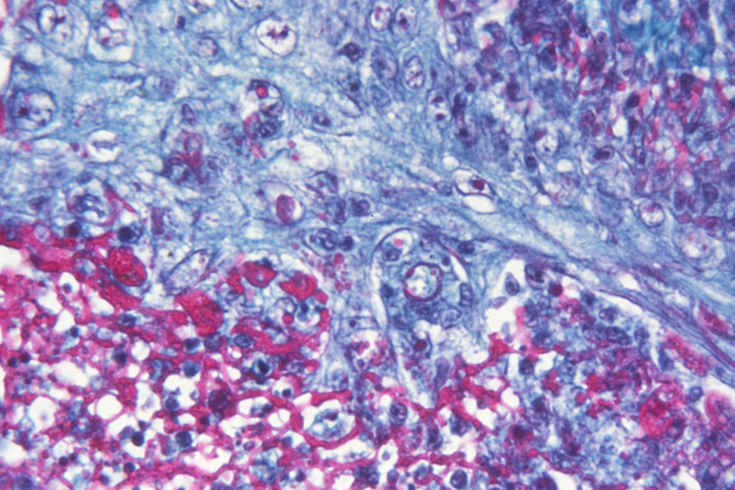
November 17, 2021
 Source/CDC
Source/CDC
Fifteen frozen vials labeled 'smallpox' and 'vaccinia' were found at a Merck research laboratory outside Philadelphia, prompting the FBI and CDC to lock down the facility and launch an investigation.The photomicrograph above shows some of the histopathologic changes seen in a human skin section that has been infected with the smallpox variola virus.
A Merck vaccine research lab in the Philadelphia area was temporarily placed on lockdown Tuesday night after the discovery of "questionable" vials inside a freezer that were labeled "smallpox" and "vaccinia," according to an alert received by the U.S. Department of Homeland Security.
Fifteen frozen vials were found at the research facility, including 10 labeled as "smallpox" and five as "vaccinia." Both are members of the poxvirus family, but the virus that causes smallpox was a particularly deadly scourge until it was declared eradicated by the World Health Organization in 1980.
The facility was placed on lockdown by the FBI and Centers for Disease Control and Prevention, but reportedly was lifted after an initial investigation.
Merck has a pair of facilities in Montgomery County in West Point and North Wales, but authorities have not identified the specific lab where the lockdown occurred. The FBI's Philadelphia Field Office declined to provide more information, referring PhillyVoice to the CDC.
A CDC spokesperson told Yahoo News that the vials were discovered inadvertently by a lab worker who was cleaning out a freezer and that the contents appeared to be intact. The worker was wearing gloves and a mask when handling the vials, officials said.
The CDC was expected to take custody of the vials Wednesday.
Only two labs in the world, one in Russia and the other at a CDC facility in Atlanta, are authorized to store samples of the smallpox virus.
A similar discovery was made in Bethesda, Maryland in 2014 when employees of the National Institutes of Health found six freeze-dried vials labeled "smallpox" in an unused storage facility. The samples were analyzed for their viability and later destroyed.
The last smallpox outbreak in the United States occurred in the late 1940s, before WHO undertook a global vaccination effort in the late 1950s that eliminated the virus over the course of two decades. Known for its high fever, rash and disfiguring pockmarks that follow, the disease had a mortality rate as high as 30% and is estimated to have killed more than 300 million people globally since the turn of the 20th century alone.
Most Americans are not vaccinated against smallpox, and those who are likely have limited remaining immunity to it. There has been debate among scientists about whether samples of smallpox should be preserved in the event that they're needed to develop a new vaccine. The Strategic National Stockpile has enough existing smallpox vaccine to inoculate everyone in the United States in the event of an outbreak or bioterror attack. The U.S. also maintains a longstanding commitment to the international community to develop reserves.
Vaccinia, the other sample discovered in the Merck lab vials, is related to the virus that causes smallpox but typically does not cause symptoms in healthy individuals. Vaccinia played an instrumental role in the history of the fight against smallpox and became the source of the modern smallpox vaccine, which is only administered to people at high risk of exposure and military personnel.
In recent years, artifacts discovered at the Mütter Museum in Philadelphia provided new insight into smallpox vaccination methods during the Civil War, when doctors carried around kits to inoculate soldiers and citizens in direct human chains. They used milder related orthopoxviruses, such as cowpox and horsepox, for cross-infection at a time before the advent of massed-produced vaccines.
The CDC said there has been no indication that anyone has been exposed to the vials collected at the Merck facility near Philadelphia. An investigation into the vials remains ongoing.